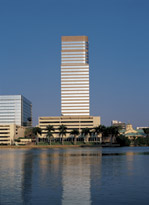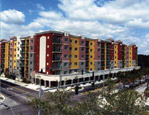|
CITY HIGHLIGHT, JUNE 2004
MIAMI FOLLOWS PATH OF GROWTH
For the most part, commercial real estate in Miami is in good
shape — or at least showing signs of improvement. The
office, multifamily and retail sectors continue to benefit
from population growth and a successful business environment.
The industrial market, however, has slowed over the last several
years.
Office
 |
|
Trophy Class A office towers,
such as 701 Brickell shown above, will enjoy proximity
to new luxury retail, residential and hotel
development laden with high-end amenities, which
is creating a “Manhattan-like”
environment for tenants in the CBD.
|
|
Reasonable expectations for improving market conditions are
expected as the U.S. economy is showing signs of strength.
The national economy is poised for steady growth this year,
according to LaSalle Investment Management. The real estate
sector, however, will have to wait until the second half of
2004 or 2005 to feel the effects of any recovery. While the
pace of job creation remains uncertain, the good news is that
new jobs will be dominated by office-based services, along
with education and healthcare as leading categories.
Miami’s outlook still remains bright as this marketplace
continues to garner some interesting and positive accolades,
getting a big boost in the first quarter as continued confidence
in its financial future was reflected by two elevated bond
credit ratings — all within a week. The Herald reports
that Standard & Poor’s ranked the city A+, representing
a “three-notch upgrade,” while Fitch Ratings, the
world’s third-largest bond-rating agency, moved its opinion
from BBB+ to A-. Last year, Moody’s raised its ranking
of Miami to A3. Miami was also ranked among the top 25 places
to do business in the country (Inc.) and ranked eighth nationwide
as one of the best cities for entrepreneurs (Entrepreneur).
An improved business environment, coupled with competitive
pricing, yielded greater commitments to area landlords. Tenant
confidence was evidenced by strong leasing activity in the
central business district and impressive positive net absorption
in the suburban sector of Coral Gables.
Within the Class A segment of the market, the most discernable
trend was the dramatic reduction and, in some cases, complete
elimination of sublease availabilities. Of the seven suburban
submarkets, three reported virtually no Class A sublease space
while the two largest, Coral Gables and Miami Airport, reduced
their sublease availabilities by 27 percent and 85 percent,
respectively. Kendall’s reduction in sublease space exceeded
35 percent while Miami Beach’s remained unchanged, at
less than 10,000 square feet. Among the prized competitive
trophy towers along the CBD’s Brickell corridor, absorption
of sublease space reduced availabilities by 90 percent. In
Downtown, Wachovia Financial Center, the city’s largest
office building, was the only one of the three competitive
Class A towers recording an increase in the amount of space
available for sublease during first quarter.
Despite good leasing activity, no significant changes were
recorded in Miami’s vacancy since the last quarter —
landlords are still battling 7 million square feet of vacant
space. Fortunately, nearly two-thirds of this year’s
estimated new construction (802,000 square feet) has been
delivered with most of the space in the new CBD buildings
now leased. In addition, Hines’ suburban project in Coral
Gables, scheduled for a mid-year 2004 delivery, is currently
one-third pre-leased. No new product in any submarket is reasonably
anticipated until 2007. This, coupled with anticipated business
expansion, would provide the best opportunity for Miami to
absorb its excess space.
— Jay Perkins, senior vice president and regional
leasing director – Florida,
leasing and management, Jones Lang LaSalle
Multifamily
Miami-Dade County ranks as the top apartment market in the
nation with occupancy rising and rents gaining momentum. Demand
from both apartment dwellers and apartment investors has picked
up in 2004. M/PF Research is showing occupancy at 97.7 percent
and rent growth of 5.1 percent for the first quarter 2004.
Year-to-date apartment sales in 2004 are nearly $600 million
(approximately 83 percent of the sales went to condominium
converters) and another $500 million in apartment assets are
on the market.
 |
|
Valencia Apartment Homes, developed
by Lane Investment & Development, is a brand
new Class AAA mid-rise in South Miami.
|
|
Condominium conversions continue to fuel the investment sales
market in Miami-Dade County (approximately 7,000 units have
been converted since January 2002). Driven by the low interest
rate environment, demand from international investors and lack
of affordable housing in Miami-Dade County, condominium conversions,
once restricted to waterfront high-rises on the beach, have
moved to western submarkets, such as Kendall, where conversions
of older garden-style properties are the norm. The recently
announced condominium conversions of Le Parc in Kendall, Mirador
on South Beach and the Village on Bayshore Drive will take approximately
2,100 units out of the rental apartment supply over the next
few years.
Infill mid- and high-rise condominium and apartment developments
are dominating the skyline in Miami-Dade due to a lack of land
available for development. Apartments under construction include
Valencia Apartment Homes by Lane Investment & Development
in South Miami, Brickell View by Summit Properties in Brickell,
Park Place at Brickell by Rilea Group in Brickell and Village
on Bayshore Drive by Finger Companies in the Media Arts and
Entertainment District.
Look for the skyline of the Brickell area to be drastically
altered over the next few years as developers break ground
on an influx of new condominium and apartment developments.
There are 3,000 units under construction in the area, and
another 4,000 are in the pipeline.
— Avery Klann, vice president, Apartment Realty
Advisors
Industrial
Industrial development in Miami-Dade County has slowed considerably
over the last several years. Developers are finding it increasingly
more difficult to acquire new land and derive profits with
the current economic climate and skyrocketing land prices
due to scarcity of industrial acreage.
Speculative construction has been abandoned over the past
year in favor of build-to-suit projects due to a soft rental
market. Warehouse condominium development has comprised the
majority of speculative construction as developers cater to
small- to medium-sized businesses seeking to take advantage
of low interest rates and purchase space versus lease.
Beacon Lakes and Pan American North Business Park are two
significant developments in progress. Beacon Lakes is a 432-acre
project, developed by Codina Group and AMB Property Corporation,
which is planned for 6.6 million square feet of industrial
space located at NW 25th Street and the Florida Turnpike in
the Airport West submarket. Beacon Lakes is significant due
to the fact that it is the only new Class A space entering
the market. Pan American North Business Park is a 160-acre
park, located at the Florida Turnpike and Okeechobee Road
in Medley, which offers land sales and build-to-suit development.
Sysco Food Services recently completed a 573,000-square-foot
facility in the park.
Airport West and Medley are the most active markets in terms
of development due to their proximity to Miami International
Airport, major thoroughfares and their inventory of developable
land, which is dwindling fast. Codina Group and Flagler Development
are the most active developers in the area — Codina with
Beacon Lakes in Airport West and Flagler Development Corporation
with Flagler Station in Medley, which will house Ryder Systems’
new $40 million facility.
The lack of available developable land in Airport West and
Medley will generate opportunities and creative transactions
in other submarkets like North Central Dade and East Hialeah
in the near future.
Overall vacancy for the county is currently 9 percent and
average asking gross rental rates have remained relatively
flat at $6.10 per square foot over the last year.
— Wayne Ramoski, senior director of industrial brokerage,
Cushman & Wakefield of Florida, Inc.
Retail
South Florida is still benefiting from impressive population
growth, its prominence as a finance and international trade
center, and low interest rates. Rental and occupancy rates
have remained stable, transaction volume and pricing continue
to escalate, and cap rates have dipped to record lows. Although
new development has been limited, demand remains high for
all product types.
With more than 20 high-rise residential projects currently
under construction in Miami-Dade County, the retail sector
is sure to benefit. A $50 million, three-story retail center
is proposed for a parcel bordered by Lenox Avenue, Alton Road,
and Fifth and Sixth streets. The project will be comprised
of 180,000 square feet of retail space and a parking garage.
Miami developer Jeff Berkowitz and partners Alan Potamkin
and Robert Potamkin are hoping to strike a deal with Publix
to occupy 45,000 square feet of the development. Other potential
tenants include Barnes & Noble, OfficeMax, Bed Bath &
Beyond and L.A. Fitness. Top national retailers are moving
into downtown with scaled-down footprints because the market
has been underserved and offers tremendous density and buying
power.
Specialty food retailers are gaining popularity in South Florida.
Natural foods chains Whole Foods Market and Wild Oats Market
are beginning to take a bite out of the dollars consumers
have traditionally spent at grocers such as Publix. These
natural foods retailers attract high-end shoppers and are
becoming the tenants of choice for new centers in upscale
communities in South Florida. Whole Foods will open a 45,000-square-foot
market at the corner of San Remo Avenue and Red Road on the
border of South Miami and Coral Gables. Wild Oats took over
a former Publix space several years ago in the Suniland Mall
on South Dixie Highway and 117th Street.
General Motors Corporation’s pension fund is reportedly
interested in selling half its interest in The Falls, a South
Miami shopping mall. The partial sale is part of a recapitalization
strategy in which General Motors plans to sell part or all
of its interest in eight malls managed by Taubman Centers.
Also for sale is the Miami Arena, built in 1988 for $52 million.
The city of Miami has a $25 million offer from Jacob Sopher,
but no deal has been inked yet. If the deal falls through,
the Arena will be auctioned off in a fire sale in June. The
property is considered to be a valuable piece of Miami real
estate, located at a key transportation juncture; residents
are urging a mixed-use development to spur urban revitalization
of the area.
Significant transactions include the sale of the 350,000-square-foot
Flagler Park Plaza, which was sold by Flagler & 82nd Ltd.,
a private local partnership, to Principal Global Investors,
a division of Principal Financial Group. Anchored by Publix,
Linens ’n Things, PetsMart, Michaels, Pep Boys, Walgreens,
Big Lots, Jo-Ann Fabrics and Office Depot, the community center
sold for $54.3 million in June 2003.
Boca Raton, Florida-based Woolbright Development Inc. acquired
South Dade Shopping Center from Schiff-Turnberry Properties
for $23.9 million in October 2003. The 211,969-square-foot
community center is anchored by Publix, AMC Theater and Chuck
E. Cheese. The center was built in 1984 and extensively remodeled
in 1993.
Weingarten Realty Investors acquired Tamiami Trail Shops,
a 110,900-square-foot neighborhood center anchored by Publix
and Eckerd. The property was acquired from Woolbright Tamiami
Ltd. for $16.2 million in June 2003.
Mills Corporation recently paid $79 million for the 30-year-old
Westland Mall in North Miami with plans to make cosmetic changes.
The mall contains approximately 830,000 square feet and has
Burdines, Sears and JC Penney as anchors.
— Lynn Leonard, vice president of marketing, NewBridge
Retail Advisors
©2004 France Publications, Inc. Duplication
or reproduction of this article not permitted without authorization
from France Publications, Inc. For information on reprints
of this article contact Barbara
Sherer at (630) 554-6054.
|
